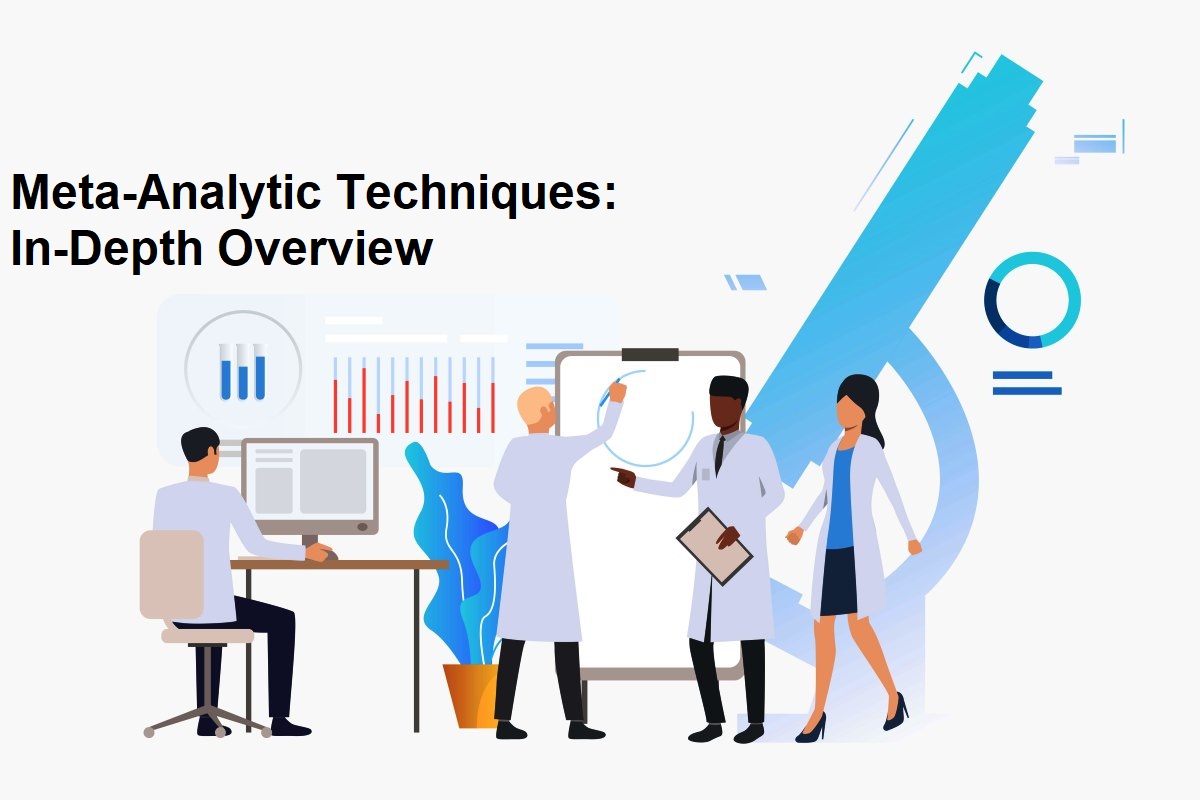Meta-Analytic refers to the use of meta-analysis techniques in research. Meta-analysis is a statistical method used to combine and summarize the results of multiple independent studies addressing the same research question.
This approach allows researchers to obtain a more precise estimate of the effect size or relationship being studied by aggregating data across studies, which can enhance the overall understanding of the topic and identify patterns or inconsistencies.
Key Aspects of Meta-Analytic Techniques
-
Data Integration:
- Effect Size Calculation: Meta-analysis involves calculating effect sizes (e.g., standardized mean differences, odds ratios) from individual studies. These effect sizes are then combined to estimate a summary effect size that reflects the overall impact.
- Weighting Studies: Studies are typically weighted based on their sample size or precision, giving more influence to studies with larger sample sizes or more precise estimates.
-
Statistical Methods:
- Fixed-Effects Model: Assumes that the true effect size is the same across all studies and any observed variability is due to sampling error. This model is used when the studies are very similar in terms of population and interventions.
- Random-Effects Model: Assumes that the true effect size varies between studies and accounts for both within-study and between-study variability. This model is more flexible and is used when studies differ in terms of populations, interventions, or methodologies.
-
Heterogeneity Assessment:
- Quantifying Heterogeneity: Tools like the I² statistic and Q-test are used to assess the degree of variability in effect sizes across studies. High heterogeneity indicates that the studies are not measuring the same underlying effect.
- Subgroup Analysis: Conducting subgroup analyses to explore potential sources of heterogeneity, such as differences in study populations, interventions, or study quality.
-
Publication Bias:
- Funnel Plots: Visual tools used to detect publication bias by plotting effect sizes against their standard errors. Asymmetry in the funnel plot may indicate bias.
- Statistical Tests: Tests such as Egger’s test or Begg’s test are used to formally assess the presence of publication bias.
-
Sensitivity Analysis:
- Robustness Testing: Evaluating how sensitive the results are to changes in study inclusion criteria, data handling, or analytical methods. This helps to assess the reliability of the meta-analytic findings.
- Influence Analysis: Identifying if specific studies disproportionately affect the overall results and conducting analyses with and without these studies to check for robustness.
-
Results Interpretation:
- Overall Effect Size: Reporting the summary effect size, confidence intervals, and statistical significance, and interpreting these results in the context of the research question.
- Practical Implications: Discussing the practical significance of the findings, including their impact on clinical practice, policy-making, or further research.
Services Offered by Meta-Analysiss.com
Meta-Analysiss.com provides a range of services to support researchers in conducting comprehensive and rigorous meta-analyses:
-
Expert Consultation and Planning:
- Study Design and Scope: Assist in defining research questions, scope, and objectives for the meta-analysis. Provide guidance on selecting appropriate methodologies and statistical techniques.
- Protocol Development: Help develop a detailed protocol that outlines the meta-analytic methods, inclusion criteria, data extraction processes, and analysis plans.
-
Comprehensive Literature Search:
- Database Searching: Perform extensive searches across relevant databases, such as PubMed, Cochrane Library, Embase, and Scopus, to identify all relevant studies and meta-analyses.
- Study Selection: Screen and select studies based on predefined inclusion and exclusion criteria to ensure the meta-analysis includes high-quality and relevant research.
-
Data Extraction and Management:
- Data Extraction: Extract data from selected studies using standardized forms to ensure accuracy and consistency. Collect data on effect sizes, sample sizes, and study characteristics.
- Data Management: Organize and manage extracted data, ensuring it is ready for analysis and meets quality standards.
-
Statistical Analysis:
- Advanced Statistical Techniques: Perform meta-analytic techniques using appropriate models (e.g., fixed-effects, random-effects) to aggregate and analyze data. Assess heterogeneity, publication bias, and perform sensitivity analyses.
- Meta-Analytic Software: Utilize specialized software tools (e.g., RevMan, Comprehensive Meta-Analysis) to conduct complex statistical analyses and produce high-quality results.
-
Quality Control and Assurance:
- Methodological Rigor: Ensure adherence to best practices and guidelines (e.g., PRISMA) throughout the meta-analysis process. Implement rigorous quality checks and peer reviews.
- Bias Assessment: Conduct thorough assessments of publication bias and methodological quality of included studies.
-
Reporting and Presentation:
- Comprehensive Reporting: Prepare detailed reports that include the methodology, results, and interpretation of the meta-analysis. Present findings in a clear and accessible manner.
- Visual Aids: Create tables, figures, and charts to effectively communicate results and support interpretations.
By leveraging these services, researchers can ensure their meta-analyses are methodologically sound, statistically rigorous, and capable of providing valuable insights into complex research questions.





